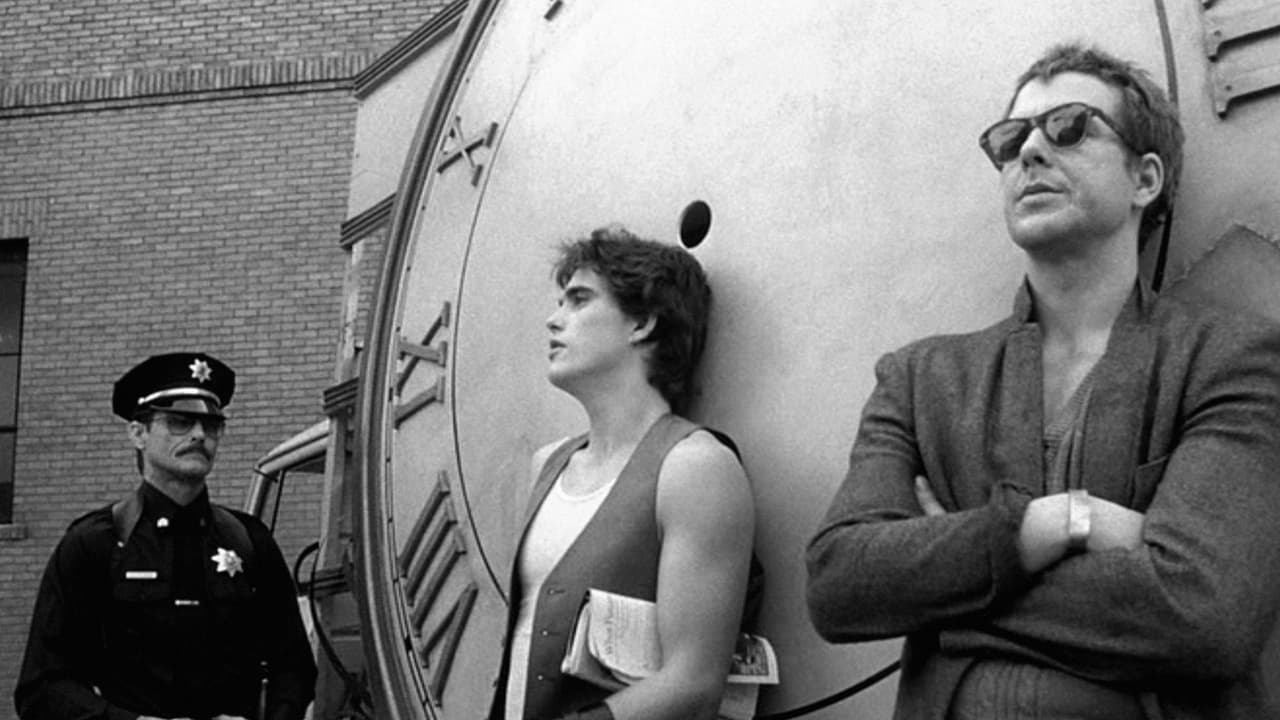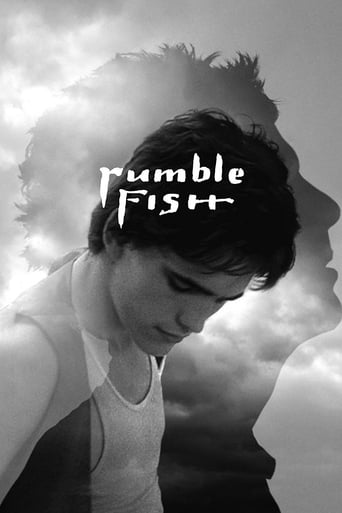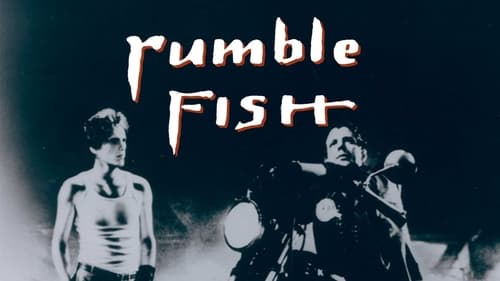



Why so much hype?
Really Surprised!
Lack of good storyline.
It's fun, it's light, [but] it has a hard time when its tries to get heavy.
View MoreThis movie became one of my favorites before I even finished it and, in my opinion, it is one of the very best movies ever made. Everything in it is just perfect, from legendary cast, to strong story and great music, crowned with genius cinematography and directing. Absolute must watch for every movie lover.10/10
View MoreRusty James (Matt Dillon) is a juvenile delinquent. He hangs out with his gang at the poolhall and gets into fights. His older brother gangleader The Motorcycle Boy (Mickey Rourke) returns home after leaving for California. He reveres his brother who is color-blind and partially deaf. He falls for school girl Patty (Diane Lane). His father (Dennis Hopper) is a drunk. He gets expel from school and falls further into darkness.Francis Ford Coppola goes experimental. The use of black and white is interesting especially considering Motorcycle Boy's color blindness. Some of his surrealism attempts look too cheesy. He uses too much smoke. He's simply trying hard at times when the smoke is coming from everywhere. The most problematic is the sound design. It's weird and annoying. This movie is screaming for a rocking soundtrack from the era. Matt Dillon has gotten pretty good as a delinquent. Mickey Rourke is too standoffish. He's capable of so much more power. Coppola tries for something usual but it doesn't really work.
View MoreRUMBLE FISH is probably one of the less-seen films in Francis Ford Coppola's oeuvre, but I found it to be an eminently watchable, artsy gem that has a great sense of mood and style. The story revolves around Rusty James (Matt Dillon), a troubled teenager who finds it difficult living up to the reputation of his smarter older brother (Mickey Rourke). The main message I took from the film is that we too often look up to people for the wrong reasons, or idealize them without having a true sense of who they are. RUMBLE FISH explores youth through a dystopian lens, and Coppola conjures up dreamlike, occasionally borderline surreal, imagery to escort us through Rusty James' world. The film is in black and white, with a few instances of color for emphasis. Stylistically, this was a kind of cross between film noir, WEST SIDE STORY and a Michael Jackson video. In particular, an early fight sequence between Rusty and another character evoked the climactic fight in WEST SIDE STORY. In general, there was this balletic quality to the way the characters moved. When combined with Coppola's eloquent cinematography and an eclectic score, the effect is often hypnotic and always engrossing. That being said, the story itself meanders a bit too much and most of the performances (by young actors) were rather rough around the edges. Of course, part of that could have something to do with how the dialogue was post-synced. But still, RUMBLE FISH ranks pretty high among the most visually interesting films I've ever seen, even if the story and performances leave a bit to be desired.
View MoreAfter his illustrious heydays in the 70s, 1980s seems to be a more productive period for Francis Ford Coppola when he delved into more scaled-down projects with more leeway for his artistic creation. RUMBLE FISH is a perfect example of this kind, released back-to-back with Coppola's other film THE OUTSIDERS, both adapted from S.E. Hinton's novel and met with mixed reviews at then. Nevertheless in retrospect, RUMBLE FISH is a sharply glossy achievement whose sterling luster of the colored fish against the canvas of high-contrast Black & White cinematography anticipated masterpieces like SCHINDLER'S LIST (1993, 9/10), and it is also a star-maker for Matt Dillon's bad boy image and etches Mickey Rourke's harrowing force of personality mixed with unfathomable mystique and magnetic sex appeal on the silver screen for eternity. In Tulsa, Oklahoma, a 17-year-old Rusty James (Dillon) accepted a rival group's challenge to meet for a one-on-one fight that night. Rusty is from a broken family, his mother left long time ago and his father (Hopper) is an inveterate drunkard. But his idol is his elder brother (Rourke), nicknamed "The Motorcycle Boy", the leader of the gang, but has left without explanation two months ago. Rusty is striving in every way to be like the Motorcycle Boy, who returns during the heat of the fight night, and rescues Rusty from a oozing knife cut. The reunion of the two brothers and their father is genuinely intimate, but soon Rusty detects that his brother is no longer the role model for whom he is intently aping all the way. Without any intention to revive the gang, ignoring his drug-addled girlfriend Cassandra (Scarwid) and obsessed with the Siamese fighting fish in the pet store, the Motorcycle Boy's elusiveness and lethargy critically presages his entrapment in the dead end with no way out. Meanwhile, Rusty has his own mess to deal with, firstly he is expelled from the high school for frequent truancy, soon his girlfriend Patty (Lane) leaves him for his wily friend Smokey (Cage) because of his fooling around in a party, then he and his nerdy friend Steve (Spano) are assailed and mugged in a dark alley, during which there is the sequences of out-of-body experience unexpectedly haul viewers out of the reality the film depicts with a frisson of excitement. After a portentous outing with his brother, underscored by the experimental soundtrack from Stewart Copeland (from THE POLICE), which conspicuously sets up an unresting and fretful atmosphere, after a motorcycle ride, the unavoidable curtain call arrives, the Motorcycle Boy is determined to release the animals in the pet store, especially the fighting fish, and states that he cannot be the brother Rusty persistently wants him to be, his demise is very much preconditioned. Oddly chimes with Rourke's monstrous imagery in the SIN CITY (2005, 8/10) and his unwelcoming sequel, the film is shot in Black & White because of it is projected from the Motorcycle Boy's angle in light of his colorblindness, Rourke is the narcissistic MVP, his soft-spoken tenderness is incongruous with the tough business he is capable of doing, the indulgent close-ups unsparingly zoom in on the actors' youthful countenances, but it is Rourke, whose bleeding handsomeness betrays a pungent tinge of melancholy and disenchantment, which lingers on for a long time. Dillon epitomizes a different kind of beauty, in a simpler and more straightforward form, his chiseled body (more alluring with the cuts) and young-looking cockiness exude with hormones of adolescence, he squanders his youth away but harbors the naive hope for a brighter future in the environs of industrial coldness, he is neither smart nor rebellious enough to be the alpha male, which makes it more harrowing when his fallen idol collapses in front of him like that, Dillon is seething with vim and vigor, fickle but dauntless and eventually he is the one who gets out of the suffocating emptiness and sees the vast sea. Lane, Hopper, Spano and Scarwid all flaunt confidently in their respective function as the superficial girlfriend, the hapless father, the devout friend and the damaged goods, they constitute a stellar supporting ensemble which also includes Cage, Fishburne.,Waits, Penn and a young Sofia Coppola. Last but not the least, it is also an astonishing job done bye the avant-garde framing mechanism, embroiders each shot with an unconventional expressive vibe, the film proves to be a Coppola's overlooked gem needs to stun and shock its new audience.
View More